Before the pandemic, Chris Hall and Stef Lowey used to order takeout meals several times a week and relied on coffee to get through busy workdays.
Then the Pender Island couple lost their jobs and decided to use their newfound free time to embark on a unique challenge: Since August, the pair has only been consuming what they can grow, catch or forage — and they plan to keep this lifestyle up for one year.
“That’s everything — right down to getting salt from the ocean and growing stevia as a sugar substitute, [to] getting milk from hazelnuts and a whole bunch of other things,” said Hall, 38.
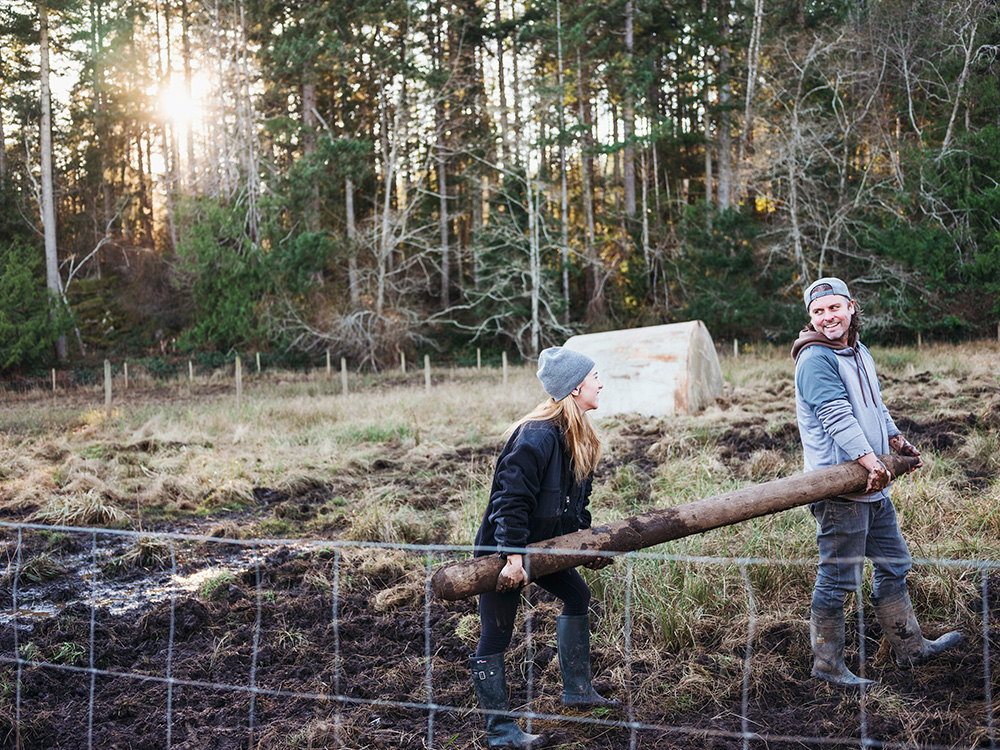
The only trip the couple makes to the grocery store these days involves buying toothpaste and personal hygiene products.
“This is something that we’ve both been interested in for a really long time, but COVID sort of kicked it into high gear and gave us the time that we needed to do it,” said Lowey, 24.
Hall and Lowey are among an increasing number of people who began experimenting with growing their own food or baking bread from scratch during the pandemic.
And while savouring fresh sourdough is one thing, experts say it’s simply not possible for everyone to be self-sustaining on a long-term basis.
“Realistically, it requires a lot of economic privilege to be able to grow and harvest your own wild foods,” said Jess Housty, a Haíɫzaqv writer and educator from Bella Bella, B.C.
“It costs money to have the boat, and the maintenance, and the fuel to go out and harvest wild meat. It costs money to remediate your soil, build your garden beds, and buy seeds. People don’t always have the ability to save for that upfront cost.”
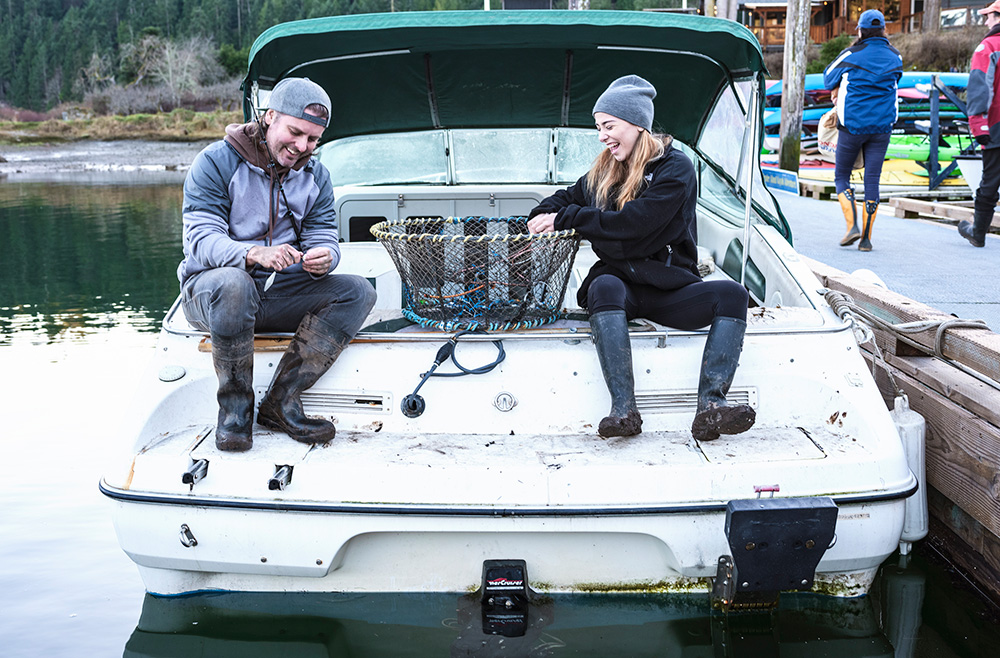
Housty associates the practice of living off the land with how her ancestors interacted with their territories, and said Indigenous peoples still strive to live sustainably and in harmony with their natural surroundings.
However, she said colonial actions, such as residential schools and the '60s Scoop, caused “deep interruptions” to the passing down of knowledge about traditional food systems from one generation to another.
Hall said his and Lowey’s mission to consume only what they can grow or catch was, in some ways, inspired by Indigenous traditions.
“We have both grown up on the West Coast and that is obviously a huge part of the heritage of this area that we have always been fascinated with. So while we do not have any direct links, [Indigenous peoples’] way of living off the land has definitely been inspiring for us,” he said.
In turn, the Pender Island couple said they’ve inspired others to follow in their footsteps.
Hall said the pair have received messages from followers of their YouTube channel who said they also want to get to a point where they can give up going to the grocery store for food and beverages.
He said with a little research and perseverance, it can be done. Before embarking on their challenge, Hall noted the couple were amateurs who, apart from gardening once in a while, had never raised farm animals or foraged for food.
“We have a friend who is a farmer here on the Island who explained it to us. We also watched a number of YouTube videos,” said Hall, explaining how they learned to butcher the chickens and turkeys they raise to eat.
“In the end, we do feel much better about doing it ourselves. We know our birds have had a great life and a humane death, which generally can’t be the same for factory-raised birds you would get at a grocery store.”
When it came time to butcher their first turkey, Hall said he was surprised to find out about a sac in their neck called a “crop” where the animals store pre-digested food.
“You have to be very careful not to cut that open, or any of the digestive system when butchering,” said Hall, admitting that he learned where it is located the hard way — by popping the crop on his first try.
And on a Facebook group about turkeys — “there’s a Facebook group for everything,” he joked — Hall said he was teased for not knowing about a tuft of beard on the birds’ chest that is used to release pheromones.
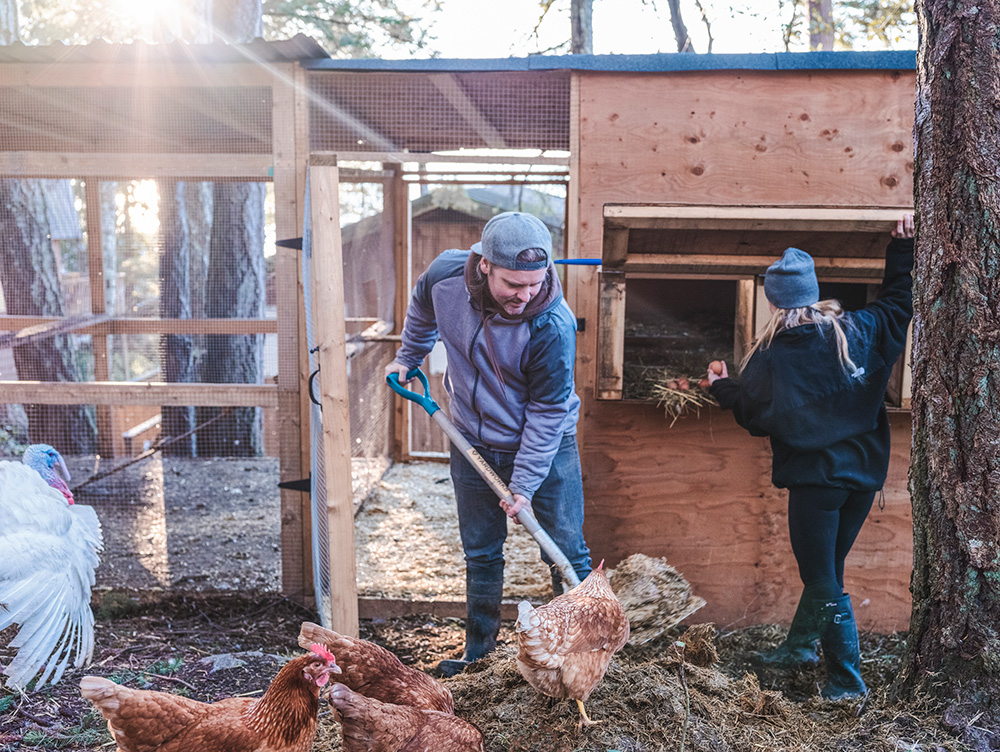
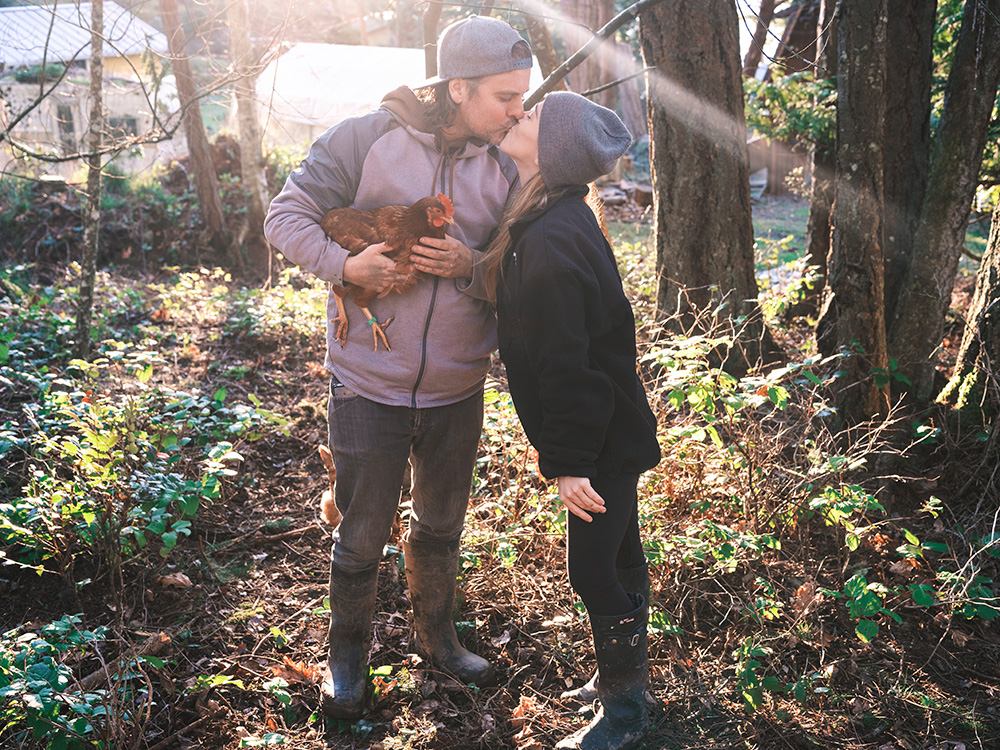
All in all, Hall and Lowey said their new lifestyle has led to better mental and physical health. The couple has lost about 70 pounds combined since they embarked on their journey in August.
“Me and Chris both lost quite a bit of weight… by just not consuming alcohol and really being aware of what we’re putting in our body. Just the extra time [we] take to cook and seeing where our food is coming from has really created a better relationship with food,” Lowey said.
Hall added, “We feel a whole lot healthier and have a whole lot more energy than we had before as well.”
While the couple’s successes are admirable, some experts say living completely off the land would be counter-productive to environmental goals if everyone started doing it.
The circumstances under which Hall and Lowey are undertaking their journey of self-sustenance are ideal, according to Dr. Lenore Newman, director of the Food and Agriculture Institute at the University of the Fraser Valley. This is not the case for everyone.
The Gulf Islands are a great location for those looking to build a farm and base their eating habits on what they can harvest, said Newman.
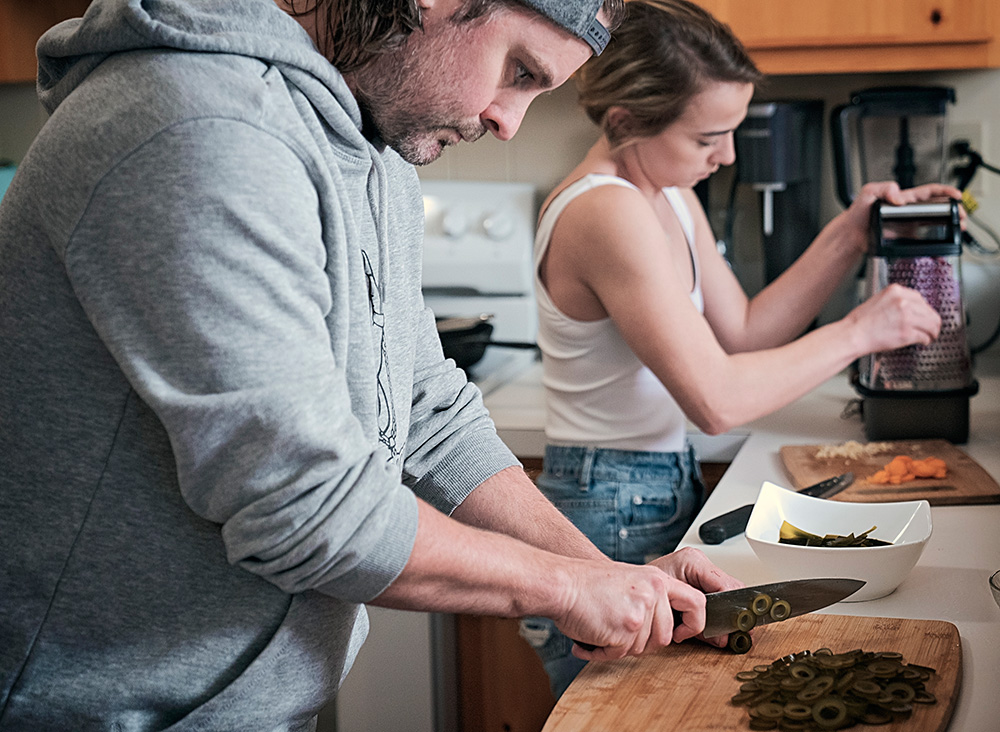
“We are lucky in that we do live in a place where there is the ability to produce food year-round, if we’re clever,” said Newman, who herself grew up as part of a fishing family in the Gulf Islands.
The fact that Hall and Lowey own a half-acre of land on which to grow their food and house their chickens is half the battle won, Newman said. But for those who do not have these privileges, it’s not a bad thing to rely on local grocery stores and butchers.
“It’s a matter of scale,” she said, using the example of a bakery business to demonstrate how it is impractical and environmentally unsustainable for all people to harvest their own food.
“If everyone in a town starts a fire to make bread every day, you use an incredible amount of fuel. But if one person who’s really good at making bread starts one slightly larger fire every day, the whole town can have bread with a much lower impact on the environment,” she said.
The problem with more and more households taking up farming space for themselves is that eventually, it could lead to more forests and ecosystems being cleared to make room.
Newman pointed out that right now, farming and agriculture already use about 40 per cent of the Earth’s available land mass.
“In terms of environmental benefit, agricultural technology is a good thing. Trading with other regions is a good thing,” said Newman, who shares her views on food sustainability in The Future of B.C.’s Food System report as part of her work on the B.C. Food Security Task Force.

“We should remember that the goal isn’t to be food self-sufficient. Not everyone can do it and we wouldn’t be able to feed everyone and maintain wild ecosystems [if they did].”
On the other hand, the pandemic has led to an uptick in the number of folks experimenting with small-scale food production. Many have taken up gardening, and growing things such as tomatoes and basil at home.
For Newman, this less-extreme approach is far more environmentally sustainable — even if done by a large number of people — while still offering some of the same benefits, like helping people learn about seasonal foods and allowing them to consume more fresh produce.
“If you do have enough money to invest in a little indoor growing, the units [required] are getting cheaper, [with] LED lighting bringing costs down a lot,” she said, adding that if someone has land, they could consider a greenhouse.
“B.C. has a great climate for that, because you can actually do it passively — you don’t even need electricity — and you will be able to produce almost year-round.”
On a larger scale, Newman said if the province used agricultural technologies to produce vegetables indoors rather than importing them from California, that would allow a return of some of the land used for farming back to the wilderness.
“That should be the goal, because it’s one of the only areas [where] we can really fight climate change in a direct way, where we’re doing something that’s going to suck carbon out of the atmosphere,” she said.
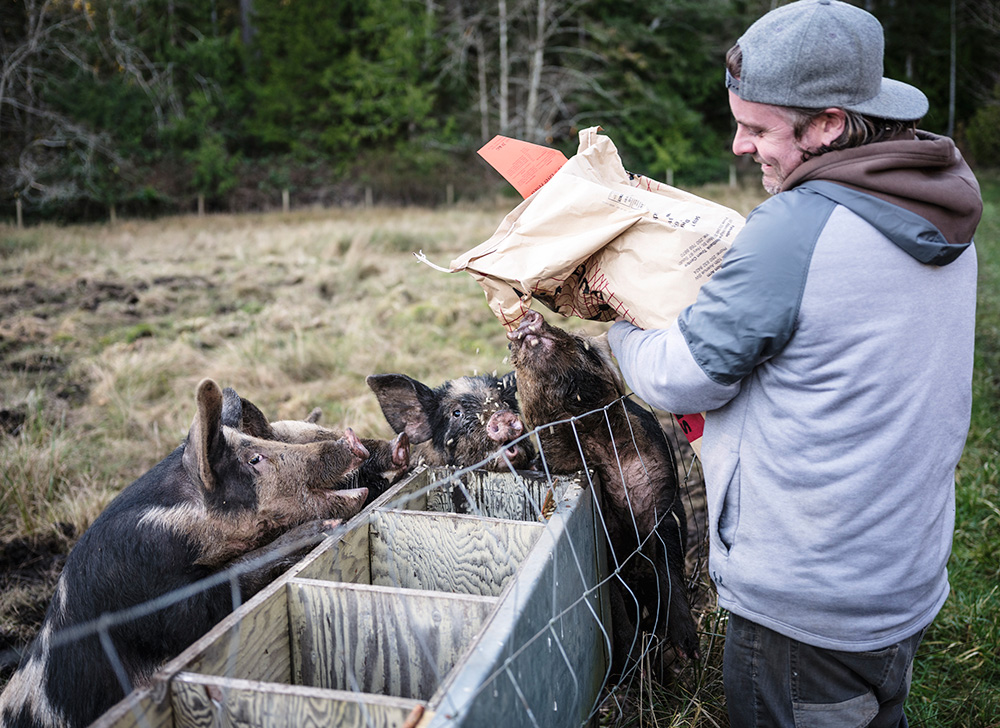
For Hall and Lowey, living entirely off the land has been a learning experience like no other.
The couple taught themselves how to grow fruits and vegetables and raise poultry and pigs — an endeavour that at first, took a lot of time and effort to set up, but became easier to maintain once the chicken coops and other animal living areas were set up.
“Obviously, we’re privileged to be on half-an-acre. We’re trying to do this on a smaller property [rather] than in a massive farm… and [we] aren’t super-experienced farmers,” said Hall.
“The community has been really great in supporting us in learning their different areas of expertise.”
Once the year-long challenge is up, the pair plans to keep integrating as much of their current food habits as possible.
But not before a week or two of binge-eating the delicacies they’ve missed most. ![]()
Read more: Local Economy, Food, Environment




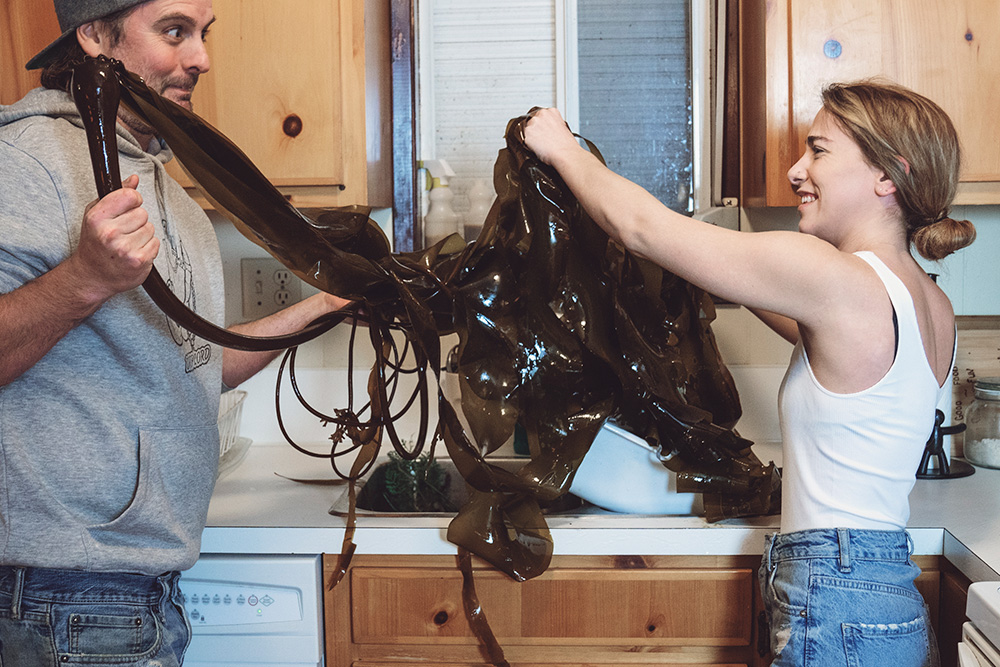












Tyee Commenting Guidelines
Comments that violate guidelines risk being deleted, and violations may result in a temporary or permanent user ban. Maintain the spirit of good conversation to stay in the discussion.
*Please note The Tyee is not a forum for spreading misinformation about COVID-19, denying its existence or minimizing its risk to public health.
Do:
Do not: